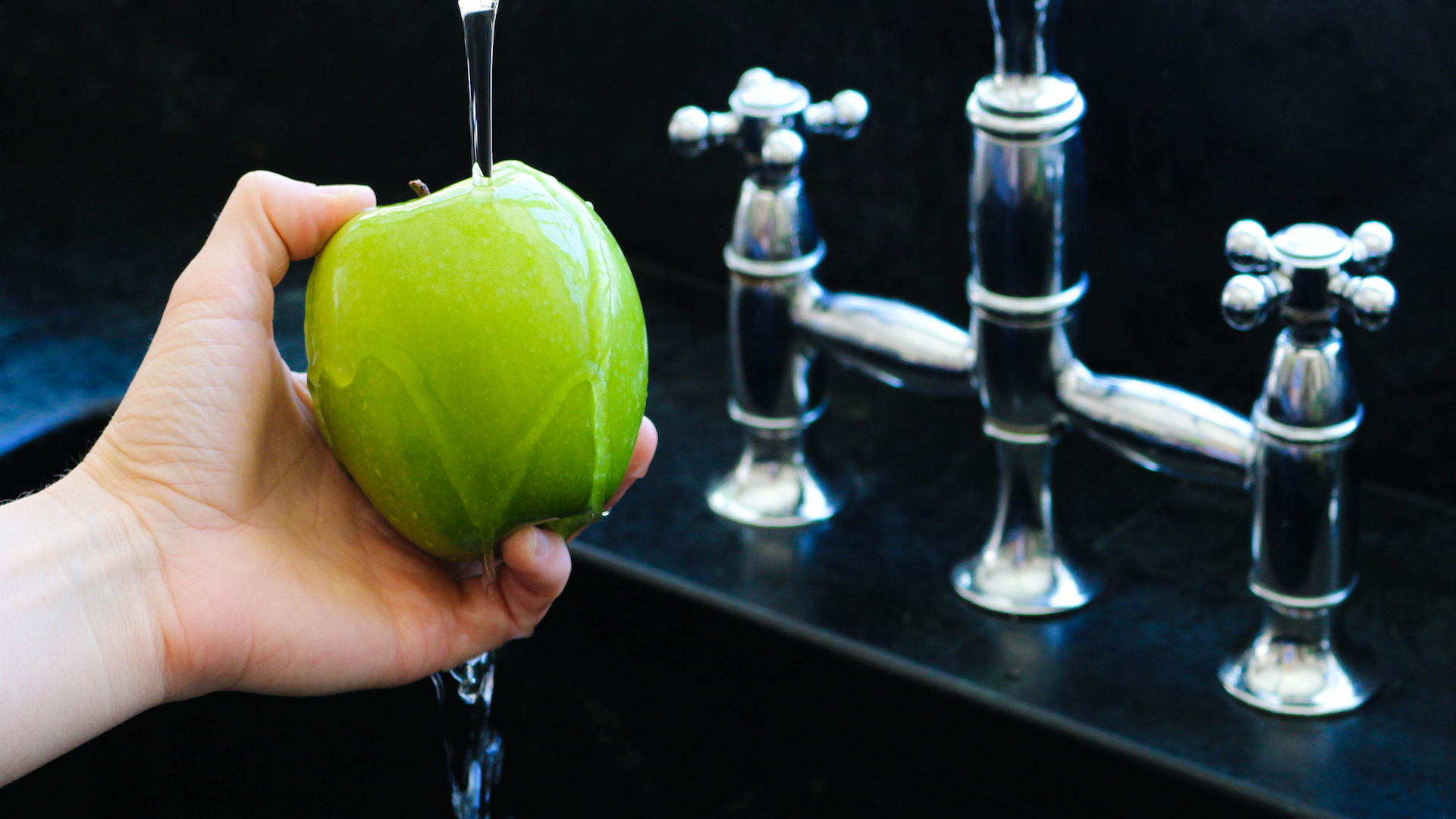How might we reduce our exposure to pesticide residues on fruits and vegetables? What about staying away from imported produce? Well, it turns out domestic produce may be even worse, dispelling the notion that imported fruits and vegetables pose greater potential health risks to consumers.
Buying organic dramatically reduces dietary exposure to pesticides, but it does not eliminate the potential risk. Pesticide residues are detectable in about one in ten organic crop samples, due to cross-contamination from neighboring fields, the continued presence of very persistent pesticides like DDT in the soil, and accidental or fraudulent use.
By choosing organic, one hopes to shift exposures from a range of uncertain risk to more of a range of negligible risk, but even if all we had to eat were the most pesticide-laden of conventional produce, there is a clear consensus in the scientific community that the health benefits from consuming fruits and vegetables outweigh any potential risks from pesticide residues. And, we can easily reduce whatever risk there is by rinsing our fruits and vegetables under running water.
There is, however, a plethora of products alleged by advertisers to reduce fruit and produce pesticide residues more effectively than water and touted to concerned consumers. For example, Procter & Gamble introduced a fruit and vegetable wash. As part of the introduction, T.G.I. Friday’s jumped on board bragging on their menus that the cheese and bacon puddles they call potato skins were first washed with the new product. After all, it was proclaimed proven to be 98% more effective than water in removing pesticides.
So researchers put it to the test, and it did no better than plain tap water.
Shortly thereafter, Procter & Gamble discontinued the product, but numerous others took its place claiming their vegetable washes are three, four, five, or even ten times more effective than water, to which a researcher replied, “That’s mathematically impossible.” If water removes 50%, you can’t take off ten times more than 50%. They actually found water removed up to 80% of pesticide residues like the fungicide, Captan, for example. So, for veggie washes to brag they are three, four, five, ten times better than water is indeed mathematically questionable.
Other fruit and vegetable washes have since been put to the test. Researchers compared FIT Fruit & Vegetable Wash, Organiclean, Vegi-Clean, and dishwashing soap to just rinsing in plain tap water. 196 samples of lettuce, strawberries, and tomatoes were tested, and researchers found little or no difference between just rinsing with tap water compared to any of the veggie washes (or the dish soap). They all just seemed like a waste of money. The researchers concluded that just the mechanical action of rubbing the produce under tap water seemed to do it, and that using detergents or fruit and vegetable washes do not enhance the removal of pesticide residues from produce above that of just rinsing with tap water alone.
That may not be saying much, though. Captan appears to be the exception. When plain water was tried against a half dozen other pesticides, less than half the residues were removed.
Fingernail polish works better, but the goal is to end up with a less toxic, not a more toxic tomato.
We need a straightforward, plausible, and safe method for enhanced pesticide removal. Is there anything we can add to the water to boost its pesticide-stripping abilities? Check out my video, How to Make Your Own Fruit & Vegetable Wash.
If you soak potatoes in water, between about 2% to 13% of the pesticides are removed, but a 5% acetic acid solution removes up to 100%. What’s that? Plain white vinegar. But 5% is full strength.
What about diluted vinegar? Diluted vinegar only seemed marginally better than tap water for removing pesticide residues. Using full strength vinegar would get expensive, though. Thankfully there’s something cheaper that works even better: salt water.
A 10% salt solution appears to work as good or better than full-strength vinegar. To make a 10% salt solution, you just have to mix up about one-part salt to nine-parts water (though make sure to rinse all of the salt off before eating!).
There’s not much you can do for the pesticides in animal products, though. The top sources of some pesticides are fruits and vegetables; but for other pesticides, it’s dairy, eggs, and meat because the chemicals build up in fat. What do you do about pesticides in animal products? Hard boiling eggs appears to destroy more pesticides than scrambling, but for the pesticides that build up in the fat of fishes and chickens, cooking can sometimes increase pesticide levels that obviously can’t just wash off. In fact, washing meat, poultry, or eggs is considered one of the top ten dangerous food safety mistakes.
For more on organic foods, see:
- Are Organic Foods More Nutritious?
- Are Organic Foods Safer?
- Are Organic Foods Healthier?
- Are the Benefits of Organic Food Underrated or Overrated?
The most important reason to wash produce is to reduce the risk of food-borne illness. Ironically, the food poisoning viruses may be found in the pesticides themselves. Check out my video Norovirus Food Poisoning from Pesticides.
For all our videos on the latest research on vegetables, visit our Vegetables topic page.
In health,
Michael Greger, M.D.
PS: If you haven’t yet, you can subscribe to my free videos here and watch my live, year-in-review presentations:
- 2012: Uprooting the Leading Causes of Death
- 2013: More Than an Apple a Day
- 2014: From Table to Able: Combating Disabling Diseases with Food
- 2015: Food as Medicine: Preventing and Treating the Most Dreaded Diseases with Diet
- 2016: How Not To Die: The Role of Diet in Preventing, Arresting, and Reversing Our Top 15 Killers
